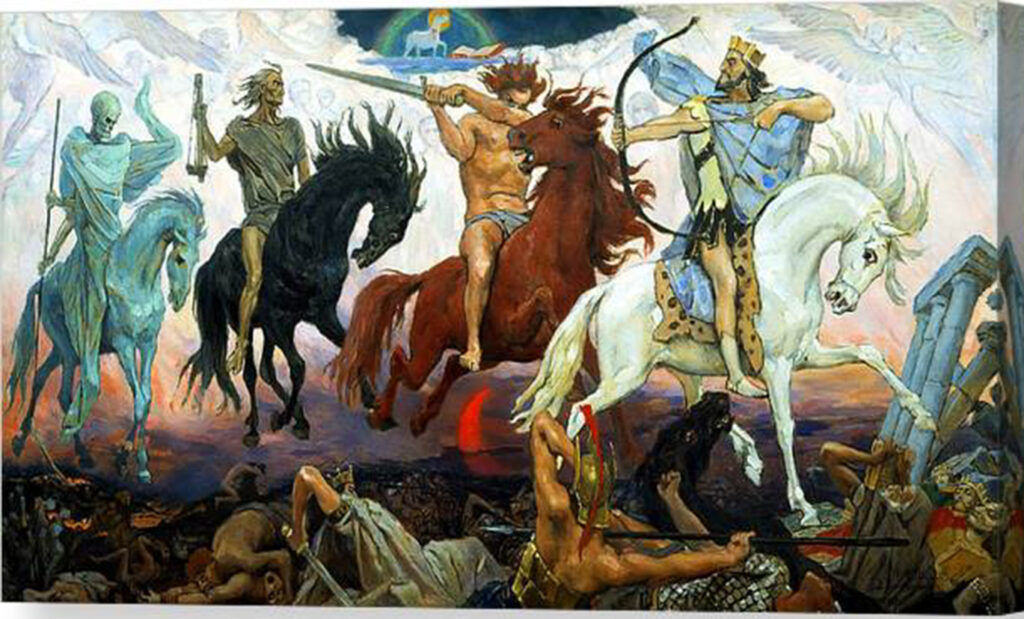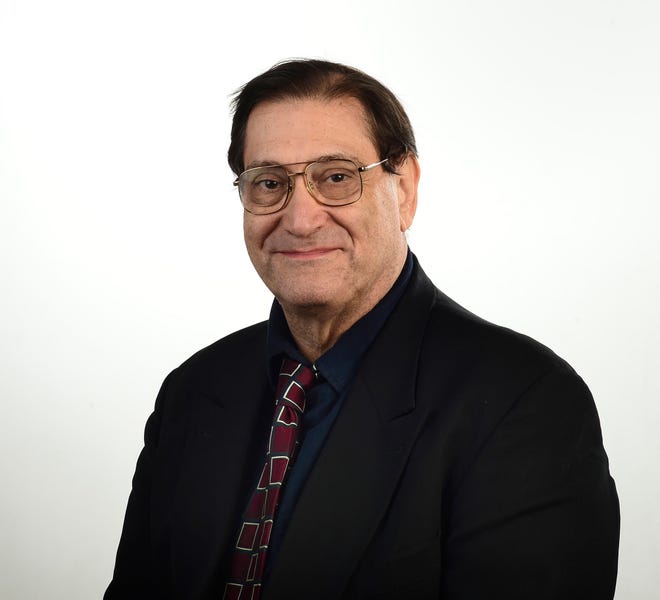From the Heart with Rabbi Liebowitz

Four Horsemen of the Apocalypse, an 1887 painting by Viktor Vasnetsov. From left to right are Death, Famine, War, & Conquest; the Lamb is at the top.
Dear Friends,
Spoiler Alert! While I am a fan of M. Night Shyamalan (The Sixth Sense, The Village etc.) I cannot in good religious conscience recommend his latest offering Knock on the Cabin. Not for the weak of heart, its violence is over the top! But what really puts me off is its theology. Yes, theology! A brief summation. Two married men have adopted an Asian baby. Four strangers arrive, break into the cabin bearing weaponry out of the dark ages. This is the least violent of the violent scenes to follow. They claim to have a common vision of the apocalypse and inform the captured and bound family that one of them needs to choose to die as a sacrifice to avoid world wide annihilation of humanity. One by one the four invaders take their own lives and as each self-sacrifice occurs a series of predicted plagues accost the planet and its humanity.
The sympathetic viewers are inclined to accept the captured family’s view that their captors are deranged. Spoiler Alert! They are not! They present the Christian four horseman so described by John in his book of revelations. Ripe for interpretation, some thought they represented Christ while others saw them as harbingers of the last judgement and the coming of the Anti-Christ. Are you put off yet? You should be!
There is a thread of Christian theology that has run rampant in the media. It is one of sacrifice, the view that for some good to occur someone must die. One can readily understand that their paradigm is based on the central drama of Christianity’s passion narrative in which Jesus’s death is a necessary key to individual redemption from sin. While our ancient history did provide for animal sacrifice as a means for atonement, human sacrifice was verboten.
Another annoying aspect of the film which Judaism ever so slightly embraced in the past is this predestination view of an apocalypse. We have more positively imagined a golden messianic age and jettisoned whatever apocalyptic anticipations were once entertained. The atavistic view of God as a puppeteer does not prevent some of our more traditional brethren from embracing such intolerable views. One Haredi rabbi in Israel commented that the recent earthquake that afflicted the Syrians in the North and the citizens of Turkey in the south was God’s way of punishing Israel’s foes. Such pernicious thinking is not only bothersome and antiquated, but cruel when I consider such theology justifies little children being buried alive for days. The hell with that! Our Jewish community can claim no full immunity to such thinking. One Jewish historian of great merit once commented in a lecture “We thank the six million for their sacrifice, so that Israel could come into being!” We must clearly assert that those six million were not offering their lives as sacrifice, their lives were snuffed out. Nor should any such horrors of the Holocaust be used to support any justification! Such a view is deeply repugnant to Judaism’s regard for every human life.
Christian theology tends to influence so much of our culture. And I am most concerned that so many of us are unable or disinterested in articulating better and more sensible theologies. We have a Spinoza and his naturalistic views. Buber and his profound philosophical offerings. Richard Rubenstein author of After Auschwitz and his evolving Jewish theologies. So many of us do not know how to fend off such thinking such as when a former president had the audacity to appeal to evangelicals by boasting he was the “Chosen
One!” Really? Jews could and should draw deeply from their heritage which contends with demagoguery and false messianic claims. God bless America! It is a land wherein we have the freedom of religion that tolerates various forms of religion some bordering on the cultic. But there is no shame, nay there should be pride in articulating our own faith’s views, even if they differ from that of the majority. Hanukkah was a rebellion against embracing the Greek obsession with externals and opulence. We Jews looked for the eternals not the externals. We built synagogues places of study, worship and charity and not museums that would only worship the past. “look not at the container but what is contained therein!” so we read in Pirke Avot the Ethics of our an- cestors. In our hope for acceptance we often go overboard in diminishing those aspects of our heritage that do not concur with other faiths, for fear of non-acceptance. Years ago, one rabbi bravely wrote a book which was widely celebrated Where Judaism differed! I wonder if it would be so embraced today!
Rabbi Yossi J. Liebowitz D.D.

